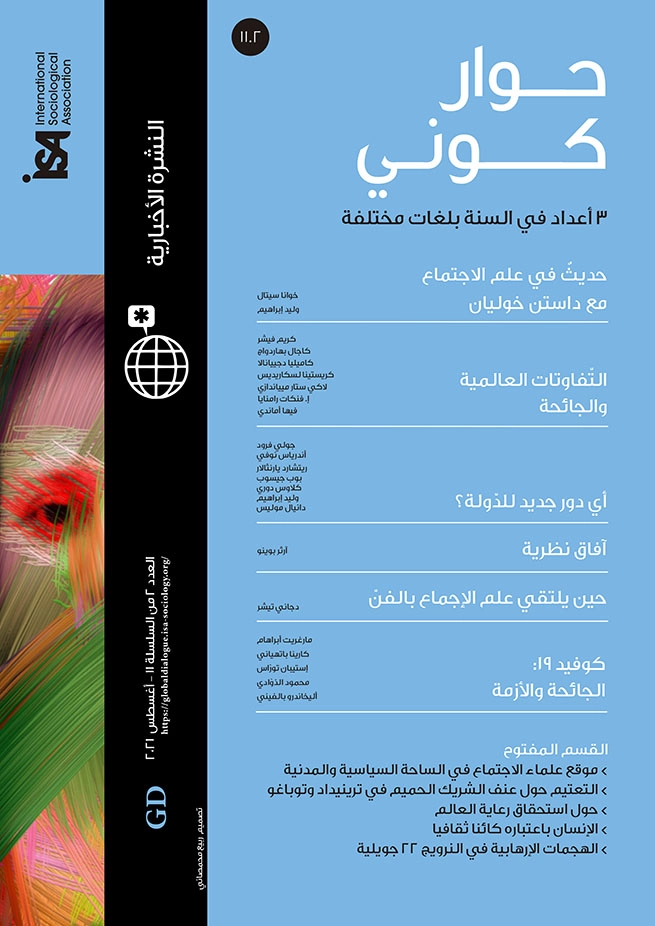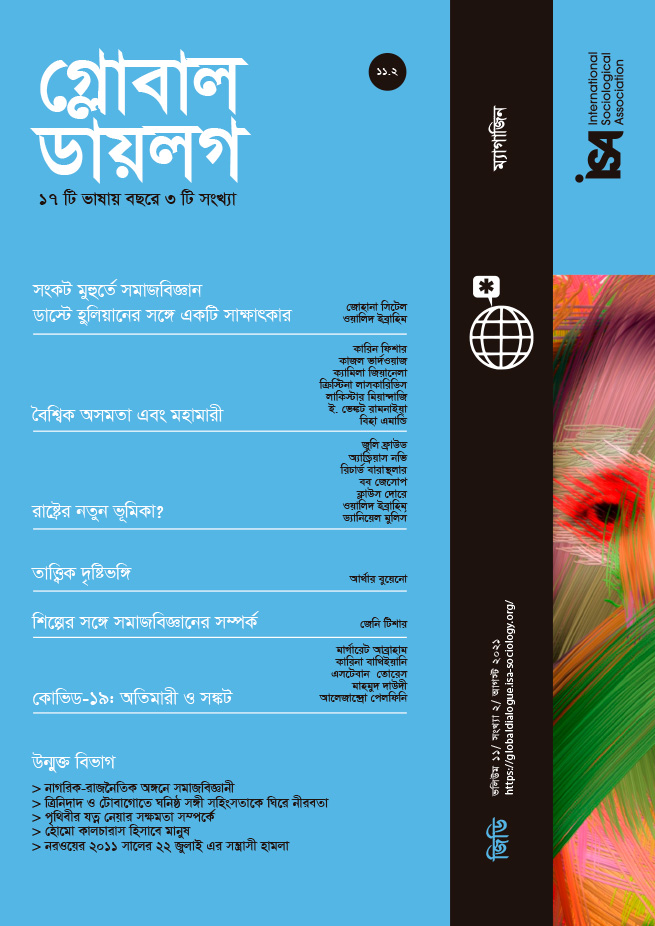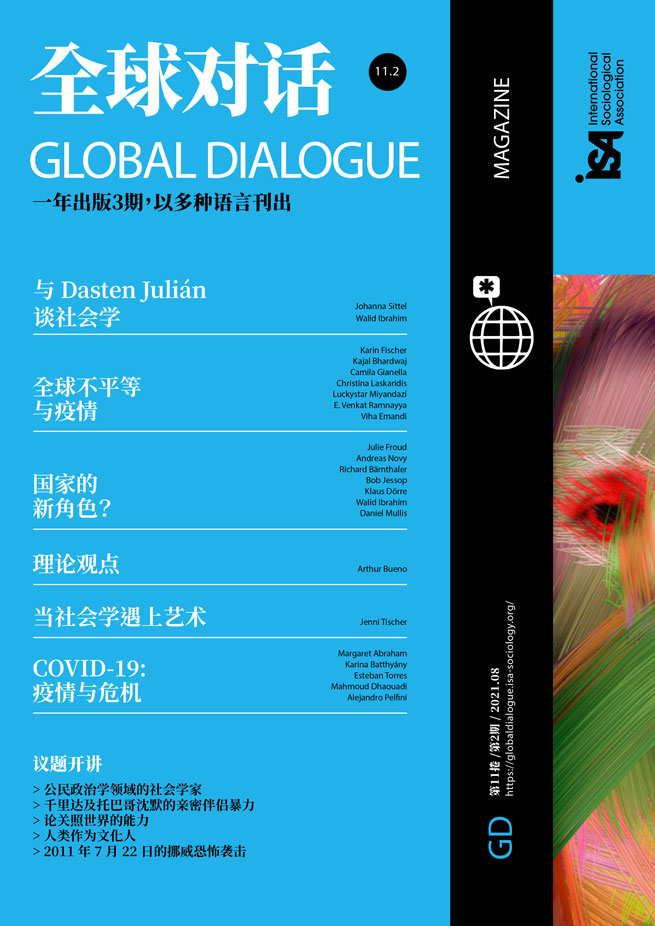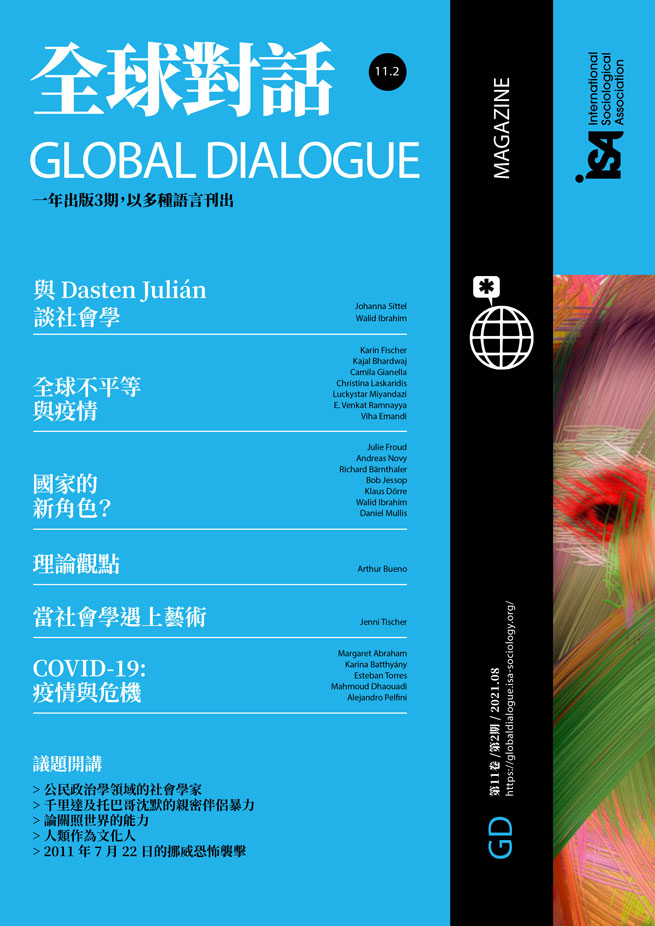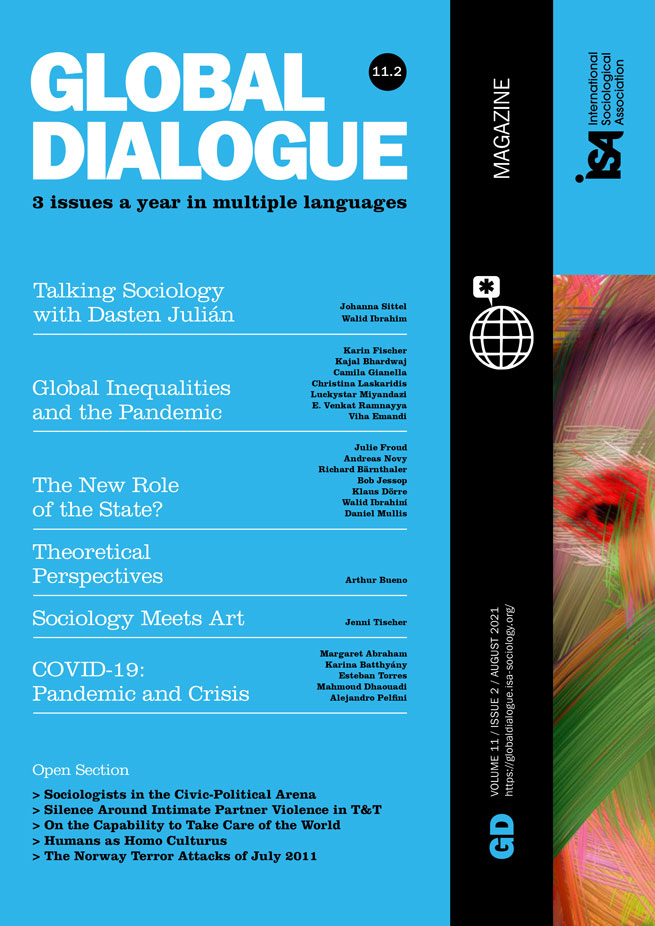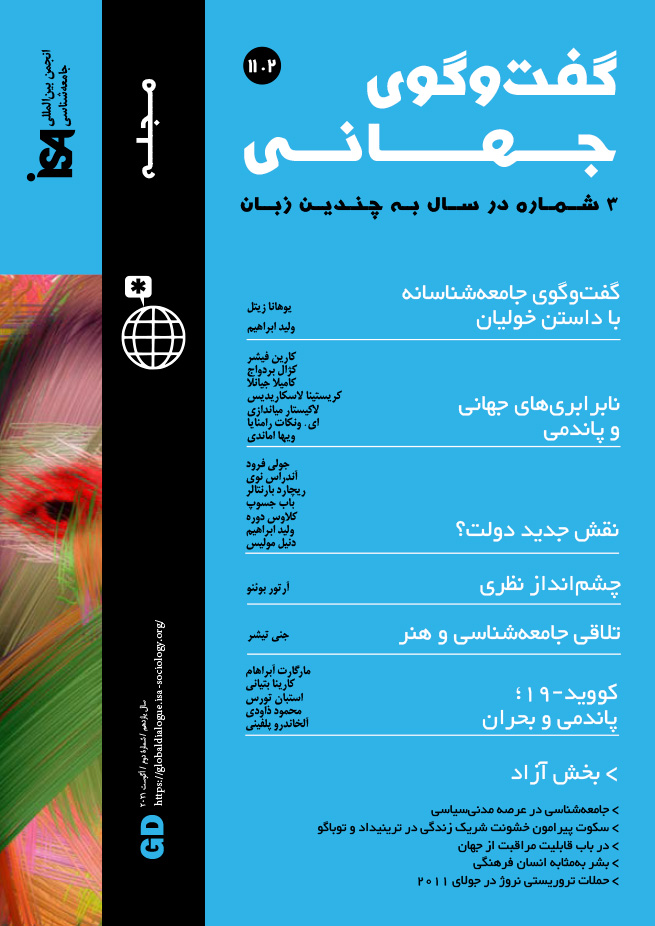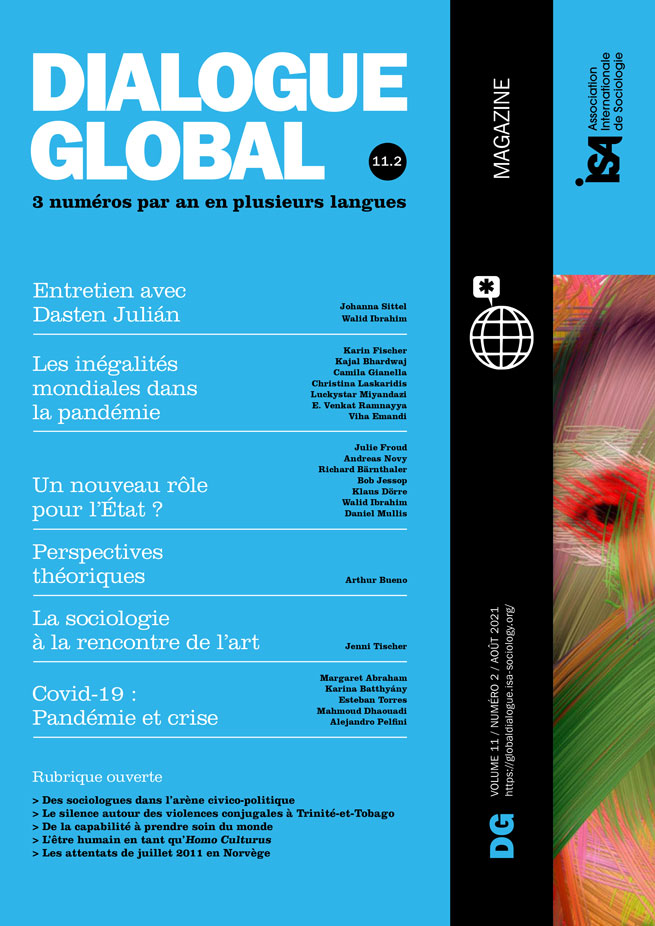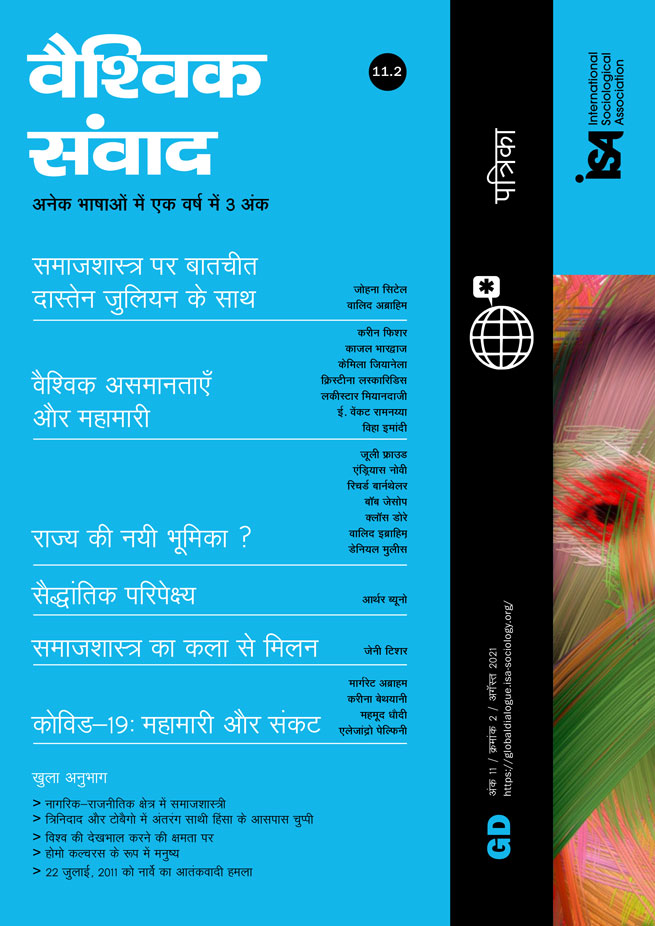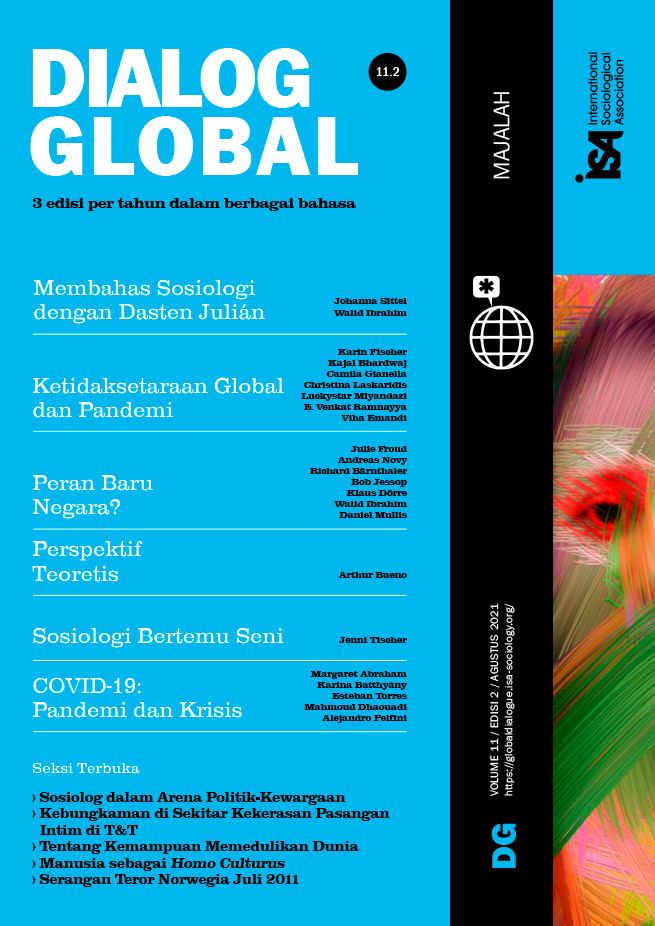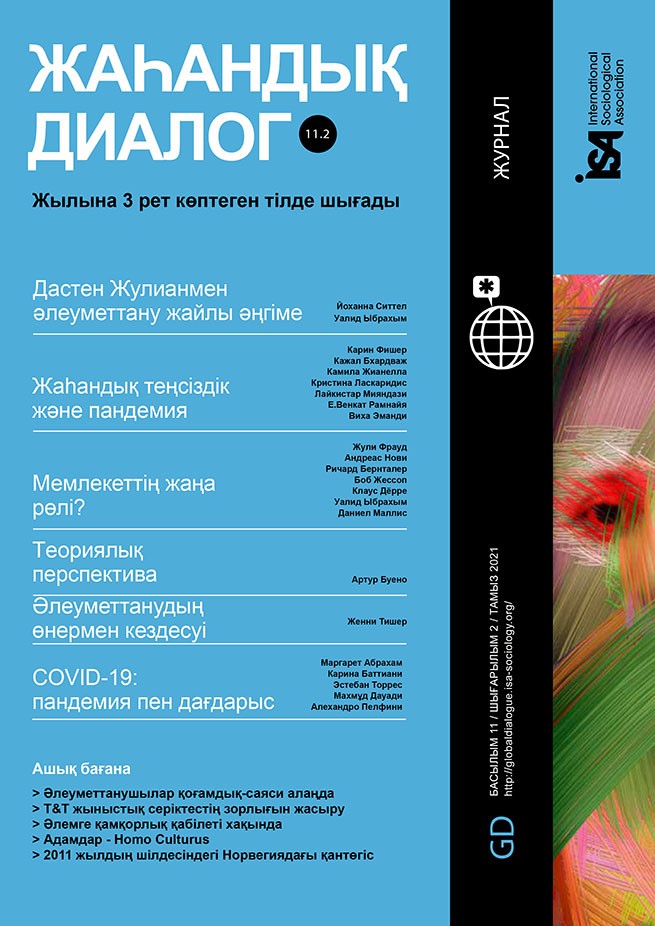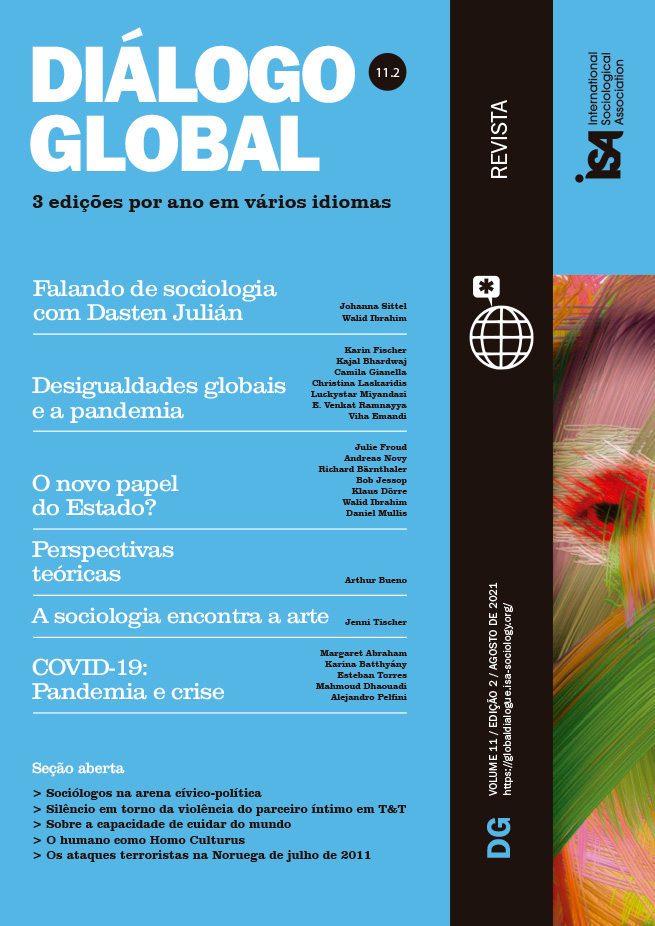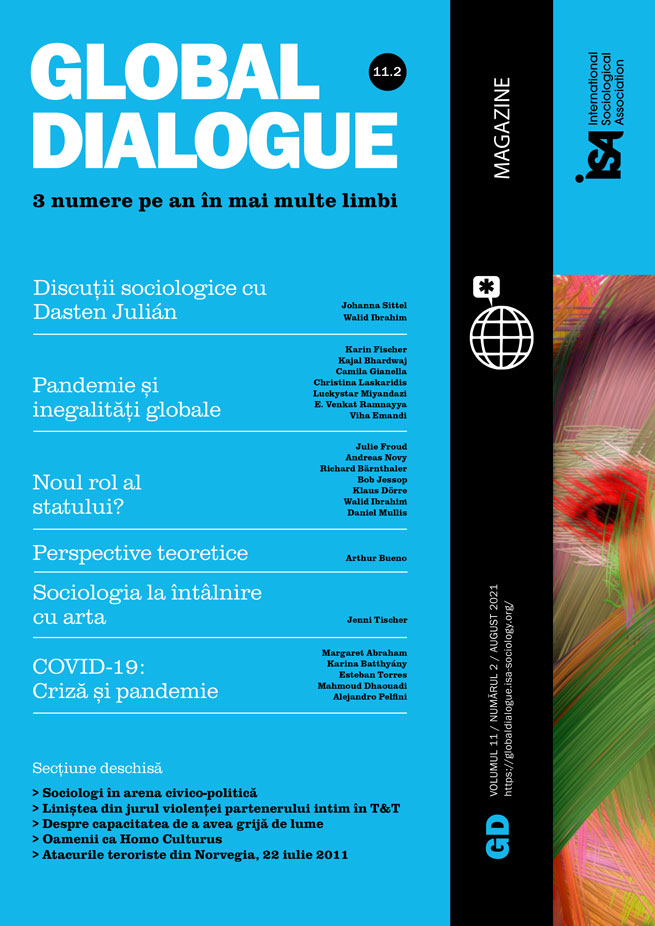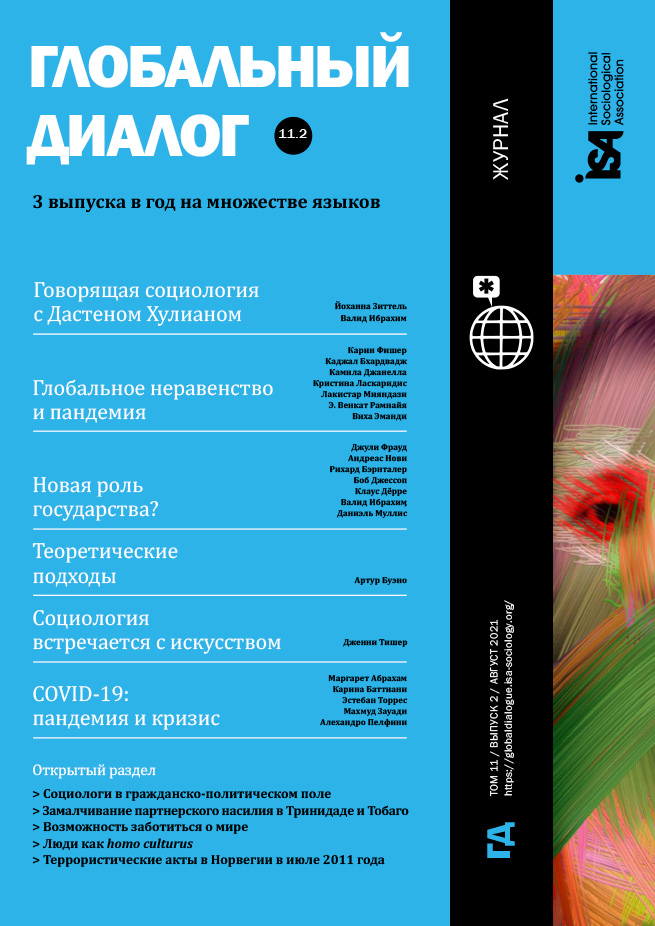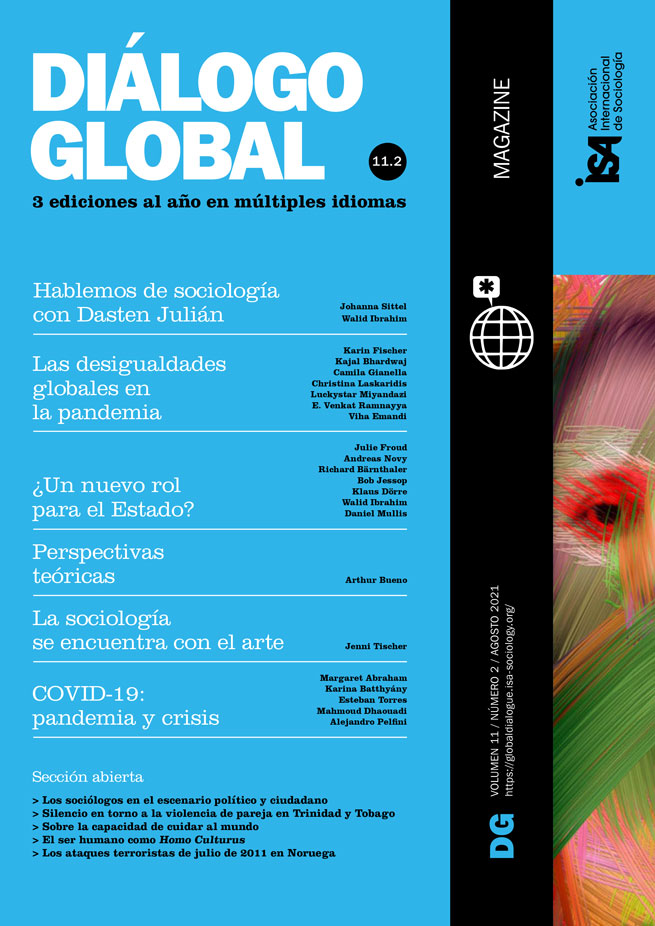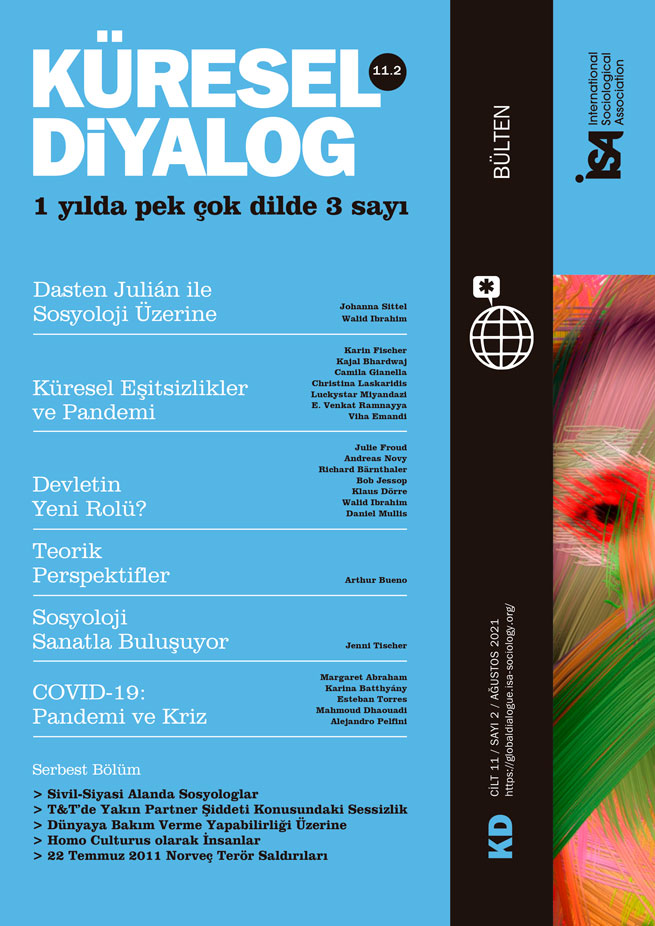Sociology in Moments of Crisis An Interview with Dasten Julián

August 01, 2021
Dr. Dasten Julián is an academic and researcher at the Institute of History and Social Sciences, the Austral University of Chile. He is currently working as principal researcher on the project “Precariousness of work in the southern macro-zone of Chile: Intersections, territories and resistance in the Maule, Ñuble, Biobío and La Araucanía regions” (2020-2023) funded by the National Research and Development Agency of Chile. He is also a research associate at the Society, Work and Politics Institute (SWOP) of the University of Witwatersrand, Johannesburg (South Africa). Dasten Julián graduated from the Friedrich-Schiller-University in Jena, Germany and works on topics such as: precarization of work and life, union strategies and organization, extractivism, public sociology, as well as work in the Global South in general. His research is carried out in close collaboration with civil society, trade unions and NGOs.
Here Dr. Julián is interviewed by Johanna Sittel and Walid Ibrahim, research associates at the Department of Industrial and Economic Sociology of the Friedrich-Schiller-University in Jena, Germany.
How did the 2019 social protests come about in Chile? The protests were sparked by a hike in public transportation fares. Was it just a small spark that broke the camel’s back, or is there more to it than that, as the state of public services and conflicts says a lot about the state of a society?
The social protests have a historical origin in the Constitution imposed by the civil-military dictatorship of Augusto Pinochet (1973-1990), with the systematic annihilation of democratic forces and the realization of a fraudulent plebiscite in 1980. At the Latin American level, Chile is the only country that retains a constitution made under military dictatorship. Its persistence in social life has a series of expressions due to the fact that it paved the way for the introduction of neoliberal policies in a brutal and total manner. In this sense, for five decades Chilean society has been intensively precarized and plundered, through a process of unbridled and unprecedented commodification.
This has been part of a political consensus between the two coalitions that have governed Chile since 1990, which have sustained the primacy of the neoliberal order on two axes: trust in the market as an entity of welfare allocation and social integration, and the Pinochet Constitution as an obstruction to the democratization of the political system. This period (1990-2019) was called the “democratic transition,” which implied a process of gradual democratization to recover certain bases of coexistence and democratic organization of society. However, the system and the institutional political actors blocked the channels of participation and active decision-making by the majorities, while the economic model reached high growth rates.
A systematic process of distrust and delegitimization of the political system was incubated, with a profound distancing from the citizenry. Processes of economic collusion, cases of irregular campaign financing, impunity in courts of justice for businessmen, etc., were some of the symptoms of a society trapped by networks of power cemented during the dictatorship. The slogan “Chile woke up” shows this moment of revelation and rebellion, of conscience, identification, and power, just as the government’s “declaration of war,” the violation of human rights (8,827 formal complaints in courts of justice) and the imprisonment of demonstrators (up to 27,432 of them) synthesizes the authoritarian, conservative, and military sense that had prevailed in formal politics.
Protests in Chile also combine very diverse subjectivities and geographies. Young people, women, the elderly, indigenous peoples, migrants, etc., develop repertoires of alliance in spontaneity and coordination. The present and the past have converged through a generational encounter of political memory in private and public spaces, the political has manifested itself in aesthetics, in artistic creativity, in music, in the streets, rural areas, as well as in assemblies, conversations, the occupation of virtual spaces, etc. As a society, we have had a cultural, political, and symbolic reencounter of great depth, which is intertwined with “dignity” as an objective, as a custom. Therefore, what is exposed in this encounter is the original and constitutive element of Chilean society, its social contract, its foundations, its Constitution.
How does the process of elaboration of the Constitution look at this moment? Is there any actor that stands out here? Do social sciences play a role or do legal experts dominate?
A National Plebiscite was held on April 26, 2020, one year ago. More than 7 million people participated. Over 78% of the voters, that is, some 5.8 million people, ratified the need for a new Constitution, as well as the need for it to be carried out by people elected to an Assembly (Constituent Convention), without the participation of members of Congress. Some 50% of registered voters voted in the process, setting a historic participation rate due to the voluntary nature of the vote.
At present, the constitution-making process is at a key moment, as the elections of those who will compose the constituent assembly will be held on April 11[1]. The composition involved a series of discussions regarding gender parity and the participation of indigenous peoples, which was not subject to elections but to government intervention and political lobbying. This required constant vigilance of the congressional decision-making processes. This collective vigilance showed the institutional capture through which the process had been taken, and that the constituent moment had acquired a new political meaning: the revitalization of the party system.
Although the revolt had an anti-party sensibility, focused on mass action, and critical of the political system, it was the organs of the state that ended up channeling and shaping the constituent process. The independent forces and their candidacies have had to face a series of difficulties and inequalities compared to candidates who are members of political parties, as reflected in the obstacles to the registration of candidacies, financing, and participation in the media, among others. This has hindered the organization of independent forces, which are already widely dispersed and fragmented.
The pandemic has limited the debate and meeting spaces for the discussion and elaboration of proposals. The social sciences have promoted a series of reflections with a critical and reflective view of the process, in an attitude of denunciation and collective awareness of human rights violations, etc., assuming a public role, leaving the academic habitus and opening up to the challenges of the moment. However, most of these interventions have been restricted to the virtual sphere or to the traditional media of books, scientific articles, etc., which has hindered their impact and massiveness. Nevertheless, it has installed a public sense of the relationship between engagement, science(s), and knowledge.
What parts of your social scientific work play a special role in the political disputes that have recently marked Chile? Are there particularly relevant areas or problems in combining engaged social science and political work?
My scientific work has emphasized research on the precariousness of work and life. I have dedicated myself to accounting for the characteristics of working and living in Chilean society considering the cultural, subjective, economic, and territorial elements that are inscribed in the intersections of power. My objectives have been to establish a local-territorial work platform with social, environmental, and trade union organizations, mobilizing connections with global research networks, and to strengthen the cohesion of the national social scientific community in labor studies.
As I have been investigating the process of social precariousness and the world of work, I have been able to see directly how work, employment, and unemployment are identified as critical places for people’s living conditions. The quality of employment, wages, automation, incomes, the introduction of platforms, and the weakness of the system of social rights put a great deal of pressure on people’s lives. Indebtedness, the search for informal jobs, or for more than one job, are part of this dispute between dignity and precariousness of life. Many of these problems are some of the cores that run through the political and social disputes in Chile, and also show the precariousness of young people, women, migrants, the elderly, etc.
Is social science to take on a responsibility, especially when conflicts come to the forefront or do you think science operates in a different time frame, perhaps in the longer term?
There are several people and working groups that have been trying to strengthen these bridges between social science and society, aiming to make visible and highlight the importance of scientific knowledge in decision-making, actions, and democratic deliberation. This gap between the world of research, the public sphere, and, especially, the activity of social movements, is what needs to be overcome. In fact, many movements such as the feminist, environmental, and other movements already give an example and allow us to have an idea of these articulations.
For their part, the responsibilities of the social sciences become clearer in moments of crisis. Conflict is often a symptom of crisis and at the same time a herald of change. This process is often a site of reference in the social sciences. Personally, my practice of sociology is a response of urgency. Such has been the war unleashed on society, the depredation and precarization, that I have had to act/do in a very present sense, which is part of the very possibilities of a precarious, flimsy, and uncertain temporality. This has its contradictions and negativities, since it hinders the idea of the future (which could enclose the lack of utopias), but at the same time it teaches a new, more practical, and active way of forging utopias in knowledge.
Are your research results perceived publicly and outside science, and are political actors interested in the results of social science research?
My experience shows me that this is the case. But I believe that the question is not whether the results are perceived, but rather whether there is a work of building paths, networks, in which knowledge is exchanged, dialogued, shared, and recreated. There is constant communication with organizations, associations, trade unions, etc. We try to mobilize our research agenda in relation to problems that we identify in reality, based on diagnoses originated in these spaces of dialogue. We aim for a harmonious approach to global scientific challenges and public problems in the region.
This is how the “Grupo de Estudios del Trabajo desde el Sur” (GETSUR) came into being. GETSUR is a local-territorial work platform, which relies on global research networks and seeks to strengthen the fabric of social and trade union organizations. We promote a synergy and symbiosis with the needs of trade union organizations, for which we have made the university available, both in terms of infrastructure and logistics, as well as in terms of knowledge and research capabilities to address specific problems in training, information, and/or reflection.
The October rebellion has indeed been a very important milestone for the social sciences. As scientists we are witnessing our own awakening, and the possibility of attending and being an actor in this awakening is also revitalizing and refreshing. I believe that the concept of precarity and precariousness offers one of the multiple possibilities for allowing us to walk along this line.
Your research topics are precariousness, the insecurities of the labor market, and how they contribute to the reproduction of societies. However, you have also participated in projects that have involved the neighborhoods and governmental institutions of Temuco in recycling models. Can you tell us a little about this research experience and identify the particular problems and challenges of this type of sociological research?
Of course. These experiences have been emerging by following the sorts of threads that I find along the way, and that, between curiosity, pedagogy and sensitivity, lead me to collaborate with other actors in the local space. Among the recycling experiences, I collaborated with a Chilean NGO called Red de Acción por los Derechos Ambientales (RADA), which is an organization that collaborates with various social movements, Mapuche communities, and territorial organizations in the region of La Araucanía and Wallmapu. They have a strategy and a “Zero Garbage” plan for waste management and handling in the city of Temuco, for which they succesfully proposed a project to a public fund for environmental protection in 2017.
We initiated this experience following the closure in December 2016 of the city’s landfill, which had been operating since 1992. The landfill had collapsed and had contaminated the groundwater of the site. It had been installed in the middle of 22 Mapuche communities in the western part of the city. The consequences for the health of the people living around it had been confirmed in several investigations, and the government had invested in public services and infrastructure as a sort of culpable mitigation for the consequences of the environmental sacrifice. The contamination affected the local economy, the living conditions and the environment. But, in this precarity many people saw in the landfill a possibility to subsist economically working with the recycling and sale of waste.
This is how in 2016 we conducted a cadaster of informal recyclers, scavengers of garbage at the landfill. Before the closure of the landfill, I collaborated in the formation of the union of recyclers together with RADA. The union had 62 members. Some were Mapuche men and women from the sector, others were people from the poorer neighborhoods of Temuco. Most of them saw it as a family job. In this task I was accompanied by a sociology student, who conducted research on the closure process and the generation of economic alternatives to recycling. It was there when, faced with the proposal of the union to seek and devise an economic space for subsistence, we thought of the proposal for the environmental protection project in an ecological way.
In your opinion, how do the two research areas – precariousness and local ecological initiatives – relate to each other?
I think the way they are related can be exemplified through the experience I was telling you about. In this experience we began to work on a first node of interrelation: the precariousness of the recyclers in their daily work and the precariousness of the Mapuche population living in the sector and enduring the environmental racism of the landfill. Both types of precariousness were intertwined in a way of understanding development, society, work, nature, and life. They were present in a conflict: the landfill, its installation, its operation, and its closure.
The garbage, as a product of a society centered on consumption and as the materiality of ecological unsustainability, showed us how precariousness multiplied around it. Workers living off garbage. People are ready to eat or look for food among the garbage. Extreme poverty and social neglect. That is why, before the closure of the landfill, the labor informality that had prevailed in recycling led to a new zone of social expulsion, where it is more difficult to develop strategies of persistence and subsistence. The formation of the trade union is not a guarantee of political strength because the institutional framework induced fragility for workers organizations, but at the same time allowed us to think of an associative figure to elaborate alternatives.
There is a series of crises that threaten human existence and hence the multiplication, no longer of risk, but of the precariousness of living. I believe that the current political disputes have introduced a political sensibility, especially the feminist, ecological, and decolonial movements of knowledge, which invite us to rethink the sense of urgency, crisis, and commitment in the face of a voracious, predatory, and war capitalism.
[1] The elections have been postponed by the pandemic. They will be held on May 15 and 16, 2021.
Dasten Julián <dasten@gmail.com>

